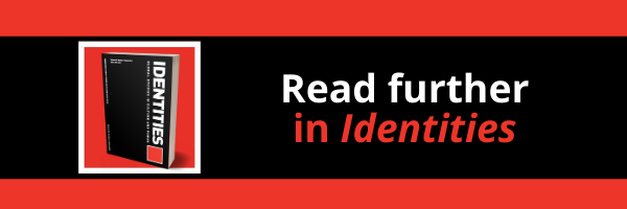|
|
|
‘Identity’ is probably amongst the most circulated terms in the academy and beyond. However, a critical reflection on the use of this term in the context of cross-cultural fictional narratives could reveal a major issue. Rather than representing a genuine state of human condition, the term has become a strategic means used by some minority writers to boost readership for their writings.
Given the hierarchies of the world literary system consisting of influential agents such as critics, publishers and marketing expectations, certain languages, regions, styles and poetics are privileged over others. The world literary system thus mirrors the ‘neo-imperial contours of global capitalism’, dominated by multinational publishing conglomerates with powerhouses in London and New York. My Identities article, ‘We have much identity’: contesting the claimed hybrid identity in Faqir’s My Name is Salma and Ahdaf Soueif’s In the Eye of the Sun’, examines how some Arab Anglophone women writers manipulate identity constructions and essentialise their hybrid identities as a strategy to boost readership and market values for their works. Through a close reading of Fadia Faqir’s My Name is Salma and Ahdaf Soueif’s In the Eye of the Sun, the article reverses the gaze on the societies that these texts claim to reveal.
Both Faqir and Soueif weave diverse experiences of Arab women at the backdrop of different cultural backgrounds including migration, exile, religion, love, marriage and sexuality. Their quest for identity is an accentuated theme reflecting their preoccupation with getting logical answers to identity questions. The article thus problematizes the claimed hybridization of identity construction sanctioned by those writers, since while the protagonists of these novels seem to have trans-cultural and hybrid identities, the diverse cultures they represent (Arab and English, Muslim and Christian) are not combined, mixed or alloyed. The cultures depicted in these texts are not in dialogic relations, but rather are conflicting and mutually expelling.
In My Name is Salma, Faqir introduces the case of a young Arab girl who is oppressed by an assortment of patriarchal practices attributed to the Arab society, including ‘honour killing’ and the ‘institutionalisation’ of Islam and its role in women’s oppression (e.g. forcing Muslim women to wear the veil). Faqir transfers the scene to the west, claiming that Salma’s passage to England is the way out of these unjust practices. In this new context, Faqir shocks the readers with a sharp shift by addressing the process of Salma’s hybridization of her identity, relying on several strategic and paradoxical representations of her new life such as her name, religion and dress. In so doing, Faqir exposes Salma’s domestic private sphere into an ideologized and sophisticated western feminist stance. Rather than originating a reflective critical infrastructure for Salma’s ethnic and subaltern identity to articulate her resistance, Faqir burdens Salma with a hegemonic enunciative voice informed by a mainstream feminist discourse. Salma’s case, as depicted by Faqir, is thus essentialized in a context that is weighted with a history of misrepresentation of otherness including Salma’s cultural background. Likewise, in In the Eye of the Sun, Soueif combines several themes including religion, love, sexuality, women’s oppression, Arab patriarchal domesticity and familial traditions to expose the submissive role of women in the Arab world. Soueif also moves into the terrain of cross-cultural narratives by adopting a western context as an emancipatory sphere for her Egyptian female protagonist (Asya) to contest the claimed patriarchal practice in her home country. Asya’s identity is constructed from a hybrid amalgamation of the eastern cultural values of her Egyptian husband (Saif), symbolically representing the Arab patriarchal authority and western liberalism represented by her British lover (Gerald). As minority writers living in the west, the position status of those writers thus reflects a strategic essentialized practice whose aim is to fit in a more powerful system. As Geoffrey Nash observes: ‘Western publishing houses demand reproduction of a specific repertoire of representations and images of Arabs. Arab authors – whether their writings are translated from Arabic or inscribed directly in western languages – have the option of acculturating to these requirements or run the risk of not getting into print’. These Anglophone women writers consciously craft their narratives to bring together two contradictory tactics: to break the centring of western literary tradition, but at the same time, to identify themselves with this tradition using its mainstream discourse.
Image credit: Author's own.
Blog post by Ayman Abu-Shomar, The University of Jordan
Read the Identities article: Abu-Shomar, Ayman. 'We have much identity': contesting the claimed hybrid identity in Faqir’s My Name is Salma and Ahdaf Soueif’s In the Eye of the Sun. Identities: Global Studies in Culture and Power. DOI: 10.1080/1070289X.2022.2109280
Read further in Identities:
Examining BSA Muslim women’s everyday experiences of veiling through concepts of ‘the veil’ and ‘double consciousness’ The Egyptian Sisters Club: negotiating community and identity in a time of conflict Control over female ‘Muslim’ bodies: culture, politics and dress code laws in some Muslim and non-Muslim countries Comments are closed.
|
|
Explore Identities at tandfonline.com/GIDE |
|
The views and opinions expressed on The Identities Blog are solely those of the original blog post authors, and not of the journal, Taylor & Francis Group or the University of Glasgow.


